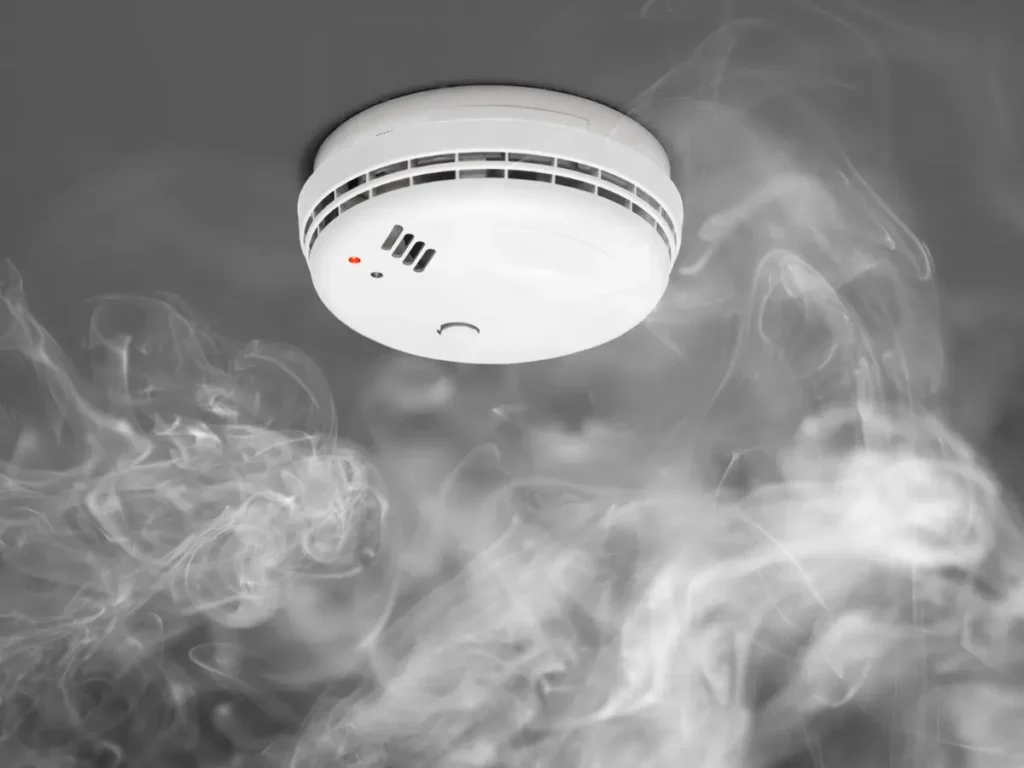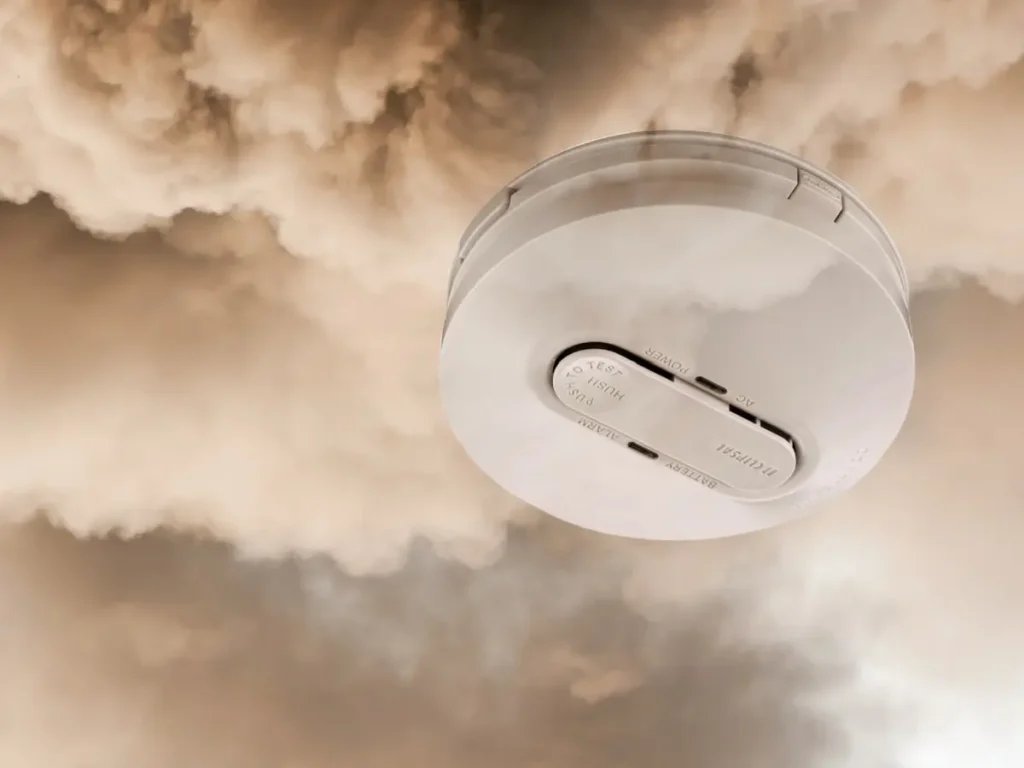If you’ve ever been roused in the middle of the night by a persistent, high-pitched beeping from your smoke alarm. You’re not alone. Though it’s easy to turn off the sounds or simply take the battery out, the reality is, your smoke alarm is sending you a message. But what exactly? In this guide, we will show you why your smoke alarm keeps beeping, common reasons for this annoying problem, and what you can do to fix it. Learn the blog whether it’s a smoke alarm beeping, a smoke detector chirping, or any other irritating sound.
Understanding Why Your Smoke Alarm Keeps Beeping

It is important to understand that your smoke alarm is not just chirping at you without a reason. Every chirp or beep is alerting you to something, whether it’s just a low battery or something more serious. Knowing such signs can make the difference between preventing a public safety issue and enduring a loud night. However, new smoke detectors are designed to warn you about problems before they become actual emergencies. But if your alarm insists on going off with no apparent threat to your safety, it’s important to determine the source of the problem.
Common Causes of Smoke Detector Chirping
The first step toward solving issues with your smoke detector is to understand the various sounds it can make.
1. Low Battery
A low battery is one of the most common reasons why your smoke alarm begins to chirp. It’ll beep in your sleep occasionally to tell you that its batteries are running low and it’s time to replace it.
Solution:
- Change the battery to end the chirping.
- Check the type of battery you have installed and ensure to use the recommended battery for your smoke alarm.
2. Dirty or Clogged Smoke Detector
Dirt can build up inside the smoke alarm over time and interfere with the sensor, causing false alarms.
Solution:
- Vacuum or dust the smoke alarm to remove any dust. You can also use a can of compressed air to blow out any dirt.
- Clean your smoke alarm often to prevent problems in the future.
3. Smoke Detector in Test Mode
A beeping smoke detector sometimes indicates test mode. This is generally a short duration, single beep to test the beeper’s operation.
Solution:
- Hold the test button down for a second or two and then release.
- If the problem still does not go away, please consult your model’s user manual.
4. Age of the Smoke Detector
Smoke detectors typically work for around 10 years. After that, they can begin to malfunction or beep incessantly to remind you to change them.
Solution:
- Test to see when your smoke alarm was manufactured. If it’s more than 10 years old, it’s time for a new one.
- Install a new First Alert smoke detector or any model recommended by experts.
5. Environmental Factors
Do you believe smoke detectors can be affected by environmental conditions? A sudden change in temperature, high humidity, or an insect getting caught in the sensor can prompt a beep.
Solution:
- Make sure the smoke detector is placed in a location that won’t be affected by environmental factors such as steam or high and low temperatures.
How to Stop Your Smoke Alarm Chirping or Beeping

Once you’ve determined what’s causing the beeping, you need to take action. Here is what to do to stop the smoke alarm from beeping or chirping!
1. Replace the Battery
If the alarm is chirping because of a low battery, replace the battery right away. Always use a new battery as specified by the manufacturer.
2. Clean Your Smoke Detector
If dirt or debris is the problem, clean the sensor out and remove any blockages.
3. Reset the Alarm
If your alarm is in test mode or a malfunction is detected, press the reset or test button to silence the beeping. Be sure to hold for a minimum of 15-20 seconds.
4. Check for Age
Replace your smoke detector if it is over 10 years old; this will help keep you safe.5. Check for a Faulty Unit
If none of the above fixes stop the chirping, then your hardwired smoke detector may be malfunctioning and need replac
How to Change the Battery in Your Smoke Detector
Swapping out the battery in your smoke detector is easy, but ensure your alarm works properly. Here’s how you can do it:
Step-by-Step Instructions:
- Shut off the power: If your smoke alarm is hardwired into your home’s electrical system, kill the power at the circuit breaker.
- Remove the smoke alarm: Ascend with a step stool or a ladder to the smoke alarm area, to take it down cautiously from its mount.
- Open the battery compartment: Many detectors have a flap or door you can open to expose the back of the battery.
- Replace the old battery: Take out the old battery and replace it with the new battery. Make certain that the new battery is consistent with your smoke alarm’s manual specifications.
- Test the alarm: After installing the new battery, please press the test button to check if it can function.
- Reattach the smoke alarm: After you’ve tested it, you can go ahead and screw the smoke alarm back onto the mounting bracket.
Pro Tip:
Try swapping out the battery every year, even if the alarm has not chirped. In this way, your smoke alarm will be ready whenever you need it.
Is Your Smoke Alarm Beeping a Sign of a Fire?
Smoke alarm beeping can frequently be traced to minor issues, like low batteries or dust, but sometimes the beeping could indicate a real emergency. Here’s how to distinguish between a false alarm and a true detection of fire:
When to Treat It as an Emergency:
- Continuous loud beep: A continuous loud beep could indicate that the smoke alarm has detected smoke or fire. In this situation, first assess if there is fire or smoke present.
- Red light flashing: Some smoke alarms have a red light that begins flashing when they detect smoke. If that’s the case, sniff around your home and make sure there’s no smoke or burning smells anywhere.
- Burning: If you smell burning or see flames, leave the home immediately and call the fire department.
When It’s Likely a False Alarm:
- Intermittent chirping: Chirps/chirping or intermittent beeping is often a sign of a low battery or due for maintenance. It’s not likely to be a fire.
- Environmental triggers: False alarms can also be caused by steam from a shower or burnt food. Examine your surroundings and rule these possibilities out.
Conclusion
It is important to know the reasons behind the smoke detector beeping in your household. Even if it’s just a matter of changing the batteries in the smoke alarm or cleaning the sensor, fixing the issue early will ensure your smoke alarm functions well. Be diligent about maintenance, and the next time, whenever you hear an untimely chirp in the middle of the night, it won’t be one of your alarms.
FAQ’s
This is usually a sign that the battery is low. Put the battery back, and the beeping should cease.
A chirping noise generally indicates that your smoke detector needs to be serviced or cleaned, or that it has reached its end of life and will need to be replaced.
It may need to be charged, is in test mode, or the sensor is dirty. Have your smoke alarm inspected for problems like these.


















